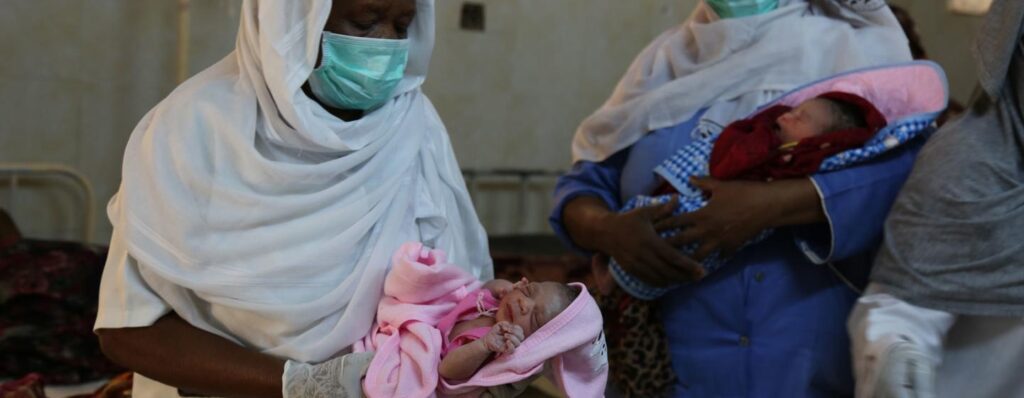Amid shelling and gunfire, Esraa cradled her newborn son. When war broke out in Sudan in April 2023, she tried to reach a clinic to treat her baby, who was struggling with infections and respiratory problems. But with roads blocked by fighting, the young mother never reached the clinic; her son died in her arms.
When she became pregnant again last August, she was tormented by the fear of losing another child. “There is only one functioning hospital for mothers left in Khartoum,” Esraa said. “It is incredibly dangerous to move around the city — one of our neighbors died on the way to the hospital.”
During the war, Esraa and her family were repeatedly forced to move, as areas that were safe one day became deadly the next. Eventually, they found refuge in an overcrowded shelter with other displaced people from Khartoum.
‘It was like going from one grave to another’
Khartoum, once Sudan’s largest city, now has vast areas that resemble ghost towns. In shelters set up for people forced from their homes, conditions are dire: overcrowding is widespread and basic hygiene is largely absent. Food is also increasingly scarce, leaving many fight against severe hunger Sudan is facing the worst levels of acute food insecurity the country has ever experienced.
As the crisis worsens and diseases such as polio and cholera are spreadingAccess to healthcare has become one of the most critical challenges for the people of Khartoum. Most medical facilities have been rendered inoperable due to destruction and severe lack of supplies.
“I was five months pregnant when I arrived at the shelter,” Esraa said. “For me, it was like going from one grave to another. We were constantly expecting something bad to happen. Hope had no place in our hearts.”

© UNFPA Sudan/Sufian Abdul-Mouty
Midwives and other healthcare professionals at Khartoum Maternity Hospital, Sudan.
Roving responders
Amid these dire circumstances, a mobile health team, supported by UN-FPA arrived at the reception center to provide reproductive health and protection services to the women and girls living there. “The mobile health teams play a crucial role in preventing maternal mortality and provide a comprehensive range of medical services in war-affected areas of Sudan,” explained Mohamed Hasan Nahat, coordinator of the team.
Esraa received prenatal care and micronutrients from the team, who came regularly to care for her and the other women and girls at the shelter. “They not only helped me with medical care, but also gave me a sense of security and hope that I hadn’t felt in months,” she said.
Four months later, Esraa gave birth to a healthy baby boy, assisted by the mobile team. “I gave birth at the shelter. They took care of me and the baby – I even named him Mohamed, after the doctor who helped me.”
UNFPA has deployed 56 mobile health teams in 11 states in Sudan, providing sexual and reproductive health services and protection and response to gender-based violence. Since the beginning of the war, the teams – including doctors, pharmacists, laboratory technicians, psychologists and midwives – have carried out more than 150,000 medical consultations.

© UNFPA Sudan/Sufian Abdul-Mouty
Midwives and other healthcare professionals at Khartoum Maternity Hospital, Sudan.
While they were saving lives and providing the only medical care many had ever received, humanitarian workers like social worker Nisreen Kamal Abdulla felt they wanted to do even more for these communities.
“The time available in the clinic was not enough to treat everyone – we should visit each community more often to reach more people and provide consistent care,” she told UNFPA. “Most of the women we met with psychological problems stopped their treatment because they could not afford the medication.”
Reaching remote communities
The mobility of teams is crucial to increasing access to essential services in remote areas, preventing maternal deaths from unsafe births and high-risk pregnancies. Too often, a lack of transportation means that many simply cannot get to a health center in time – or at all.
On average, a team visits three different locations per week, spending one to two days at each location, depending on the size and needs of the community.
“Although I did not leave Khartoum during the war and continued to work in the hospitals there, this experience was different,” Dr. Nahat explains.
“I reached far-flung areas and connected with people I had not been able to reach before. It was a great morale boost for them to know that there are organizations that care about them and will not abandon them.”







